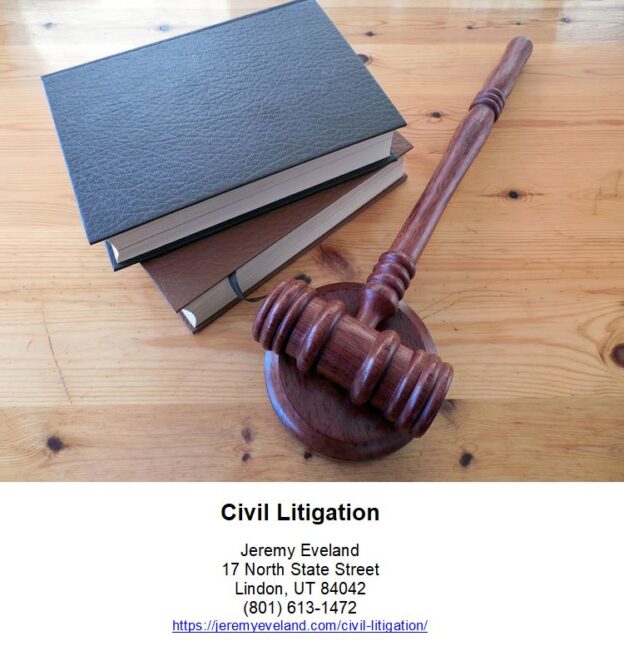Have you found yourself in need of legal advice? Look no further than attorney Jeremy Eveland, a trusted and knowledgeable Barrister specializing in various legal matters. In this article, we will delve into the world of Barristers, providing you with comprehensive information to help you understand the role they play in the legal system. From their extensive education and training to their expertise in courtroom advocacy, we will highlight the key aspects of being a Barrister. If you’re facing a legal issue, don’t hesitate to reach out to attorney Jeremy Eveland for a consultation. His expertise and guidance can help you navigate the complex world of law with confidence.
What is a Barrister?
A barrister is a legal professional who specializes in representing clients in court, providing expert legal advice, and advocating for their clients’ interests. In the legal profession, barristers are often recognized as skilled and knowledgeable advocates who play a crucial role in the justice system. They are highly trained individuals who have a deep understanding of the law and the ability to effectively present arguments and navigate complex legal issues.
Definition of a Barrister
A barrister is a legal professional who is qualified to appear and advocate in court on behalf of clients. They are typically called to the Bar after completing extensive training and education in law. Barristers have the credentials and expertise to analyze legal issues, provide legal advice, and represent individuals, organizations, or government agencies in court proceedings. They often work alongside solicitors to ensure the best representation for their clients.
Role and Responsibilities of a Barrister
The primary role of a barrister is to represent their clients in court hearings, trials, and other legal proceedings. They provide expert legal advice and guidance throughout the legal process, ensuring that their clients’ interests are protected. Barristers are skilled advocates, using their knowledge of the law and their persuasive abilities to present arguments, cross-examine witnesses, and negotiate on behalf of their clients.
Aside from courtroom appearances, barristers also have other responsibilities. They conduct legal research to prepare for a case, draft legal documents, such as pleadings and briefs, and provide legal opinions and advice to clients. Barristers often work closely with solicitors, who handle the initial client contact, gather evidence, and manage the overall strategy of a case. This collaborative approach ensures that clients receive the most effective representation and guidance.
Qualifications and Training to Become a Barrister
Becoming a barrister requires a rigorous and extensive educational path. To qualify as a barrister in England and Wales, individuals must complete a three-step process known as the “Bar Professional Training Course” (BPTC). This course builds upon an undergraduate law degree and focuses on developing the necessary skills and knowledge required to practice as a barrister.
After completing the BPTC, aspiring barristers must secure a pupillage, which is a period of practical training under the supervision of an experienced barrister. This valuable hands-on experience helps barristers-in-training develop their advocacy, research, and drafting skills while gaining exposure to different areas of law.
Once the pupillage is successfully completed, individuals are “called to the Bar” and become members of one of the four Inns of Court: Lincoln’s Inn, Gray’s Inn, Inner Temple, or Middle Temple. Membership in an Inn of Court is essential for barristers, as it provides opportunities for ongoing professional development, networking, and support throughout their careers.
Differences between Barristers and Solicitors
Overview of Barristers and Solicitors
While barristers and solicitors are both legal professionals, there are significant differences in their roles and functions within the legal system. Barristers focus primarily on courtroom advocacy and providing expert legal advice, while solicitors have a broader range of responsibilities, including direct client contact, legal research, and negotiation.
Distinct Roles and Functions
Barristers are typically instructed by solicitors to provide specialist advice and representation in court proceedings. They often specialize in specific areas of law and are called upon to provide their expertise to support solicitors and their clients. Barristers excel in oral advocacy and have the ability to present compelling arguments and cross-examine witnesses effectively.
On the other hand, solicitors are the initial point of contact for clients seeking legal assistance. They gather evidence, provide legal advice, draft legal documents, and negotiate settlements. Solicitors work closely with clients and guide them through the legal process, ensuring that their best interests are served.
Collaboration between Barristers and Solicitors
The relationship between barristers and solicitors is collaborative, with each profession complementing the other’s skills and expertise. Solicitors engage barristers when their clients require specialist advice or representation in court. Barristers rely on solicitors to prepare cases, gather evidence, and manage the overall strategy of a case.
This collaborative approach ensures that clients receive comprehensive and effective legal representation. Barristers and solicitors work together closely, sharing information and expertise, to achieve the best possible outcome for their clients. This teamwork and mutual support are crucial in providing quality legal services.
Types of Legal Cases Handled by Barristers
Barristers handle a wide range of legal cases across various areas of law. Their expertise and specialization allow them to provide effective representation in different types of cases. Some common areas of law where barristers are frequently involved include:
Criminal Cases
Barristers play a vital role in criminal cases, representing clients who are facing criminal charges. They examine the evidence, cross-examine witnesses, and present legal arguments in court to protect the rights of their clients. Barristers work diligently to ensure fair and just outcomes in criminal proceedings.
Civil Cases
In civil cases, barristers advocate for clients involved in disputes relating to contracts, property, personal injury, and other civil matters. They provide legal guidance, draft legal documents, and present arguments in court to protect their clients’ interests. Civil barristers aim to achieve favorable outcomes and resolutions for their clients through skillful advocacy and negotiation.
Family Law Cases
Barristers specializing in family law handle cases related to divorce, child custody, adoption, and other family-related matters. They provide legal advice, draft documents such as petitions and affidavits, and represent clients in Family Court. Family law barristers strive to ensure the best interests of their clients, particularly when dealing with sensitive family issues.
Employment Law Cases
Employment law barristers assist clients with legal issues arising from the employer-employee relationship. They handle cases involving unfair dismissal, discrimination, harassment, and contractual disputes. Barristers specializing in employment law provide expert advice, represent clients at employment tribunals, and strive to protect their clients’ rights in the workplace.
Commercial Law Cases
Commercial barristers specialize in legal matters related to business and commerce. They handle cases involving contracts, corporate disputes, intellectual property rights, and other commercial issues. Barristers working in commercial law provide strategic advice and representation to businesses, ensuring that their clients’ interests are protected and upheld in a competitive business environment.
Process of Engaging a Barrister
Engaging a barrister involves several steps, from the initial consultation to the representation in court. Understanding this process can help clients navigate the legal system effectively and make informed decisions about their legal matters.
Initial Consultation
The first step in engaging a barrister is to schedule an initial consultation. During this meeting, the barrister will listen to the client’s legal issues, gather relevant information, and evaluate the strength of the case. This consultation allows the client to discuss their concerns, ask questions, and gain an understanding of the barrister’s expertise and approach.
Review of Case
After the initial consultation, the barrister will thoroughly review the case. They will analyze the evidence, research relevant laws and precedents, and assess the potential strengths and weaknesses of the client’s position. This review is essential to develop a strategic approach that maximizes the client’s chances of success.
Legal Opinion and Advice
Based on their review of the case, the barrister will provide the client with a legal opinion and advice. They will inform the client of the legal options available, assess the chances of success, and provide guidance on the best course of action. The barrister’s expertise helps clients make informed decisions about how to proceed with their legal matter.
Representation in Court
If the case proceeds to court, the barrister will represent the client in hearings, trials, or other legal proceedings. They will prepare legal arguments, cross-examine witnesses, and present the client’s case in a persuasive manner. Barristers’ strong advocacy skills and in-depth knowledge of the law ensure that clients receive effective representation in court.
Fees and Billing
Barristers typically charge fees for their services, and the cost can vary depending on the complexity and duration of the case. It is essential for clients to discuss fees and billing arrangements with the barrister during the initial consultation. Barristers often have set hourly rates or fixed fees for specific services. Clear communication about fees ensures transparency and helps clients make informed decisions about their legal representation.
Skills and Qualities of a Successful Barrister
To be a successful barrister, individuals must possess a diverse range of skills and qualities that contribute to their effectiveness in the legal profession. These skills and qualities enable barristers to excel in advocacy, provide expert legal advice, and navigate complex legal issues.
Strong Oral and Written Advocacy
Oral and written advocacy are essential skills for barristers. They must have the ability to articulate complex legal arguments clearly and persuasively in court. Strong public speaking skills, including effective delivery, organization of arguments, and the ability to think on their feet, are crucial for success as a barrister. Additionally, barristers must have excellent written communication skills to draft legal documents and provide written submissions.
Analytical and Research Skills
Barristers must have superior analytical and research skills to effectively analyze legal issues, identify relevant precedents, and construct compelling legal arguments. The ability to critically analyze complex information, apply legal principles, and identify the strengths and weaknesses of a case is crucial in providing sound legal advice and representation.
Negotiation and Mediation Skills
Barristers often engage in negotiations with opposing parties to seek settlements or resolve disputes outside the courtroom. Effective negotiation skills, including the ability to communicate persuasively, engage in constructive dialogue, and find common ground, are essential for successful outcomes. Mediation skills are also valuable for barristers, as they may be called upon to participate in formal or informal mediation processes.
Attention to Detail
Attention to detail is a critical skill for barristers, as they must carefully analyze legal documents, contracts, and evidence. Small details can have a significant impact on a case, and barristers must have the ability to spot and analyze these details effectively. Diligence and thoroughness in reviewing and preparing legal documentation contribute to the quality of their representation.
Time Management and Organization
Barristers often handle multiple cases simultaneously and must effectively manage their time and workload. The ability to prioritize tasks, meet deadlines, and work efficiently under pressure is crucial in the legal profession. Proper organization of case materials, thorough preparation for court proceedings, and efficient documentation management contribute to a barrister’s overall effectiveness.
Famous Barristers in History
Throughout history, there have been several notable barristers who have made significant contributions to the legal profession. Their expertise, advocacy skills, and commitment to justice have left a lasting impact. Here are some famous barristers worth mentioning:
Sir Edward Marshall Hall
Sir Edward Marshall Hall was a highly regarded criminal barrister known for his skillful advocacy and passionate defense of his clients. He was involved in several high-profile murder trials and is considered one of the greatest advocates in British legal history.
Sir Lionel Luckhoo
Sir Lionel Luckhoo was a prominent barrister from Guyana who achieved recognition for winning 245 consecutive murder acquittals. With an impressive track record in criminal defense, he was recorded in the Guinness Book of World Records as “the world’s most successful advocate.”
Helena Normanton
Helena Normanton was the first woman to practice as a barrister in England. She dedicated her career to promoting gender equality in the legal profession and fought for women’s rights. Normanton’s advocacy had a significant impact on the inclusion of women in the legal profession.
George Carman
George Carman was a renowned barrister known for his exceptional courtroom skills and flamboyant style. He handled several high-profile cases and represented clients such as alleged murderers, politicians, and celebrities. Carman’s eloquence and effective advocacy made him one of the most successful barristers of his time.
Constance Briscoe
Constance Briscoe paved the way for diversity in the legal profession as one of the first Black women to practice at the English Bar. She made significant contributions to family law and served as a judge of the Crown Court in England. Briscoe’s achievements have inspired aspiring barristers from underrepresented backgrounds.
Challenges Faced by Barristers
Being a barrister is not without its challenges. The legal profession can be demanding and stressful, requiring barristers to overcome various obstacles in their careers. Some of the challenges faced by barristers include:
Heavy Workload and Long Hours
Barristers often juggle multiple cases and face demanding workloads. The preparation of legal cases can be time-consuming and intense, requiring long hours of research, analysis, and drafting. Balancing these responsibilities with personal commitments can be a significant challenge in a barrister’s career.
Emotional and Mental Stress
The nature of the legal profession, where barristers often deal with difficult and emotionally charged cases, can take a toll on their emotional and mental well-being. The pressures of representing clients, navigating complex legal issues, and dealing with contentious situations can contribute to stress, anxiety, and burnout.
Maintaining Professionalism
Barristers must maintain high standards of professionalism at all times, ensuring that they adhere to the Code of Conduct for the Bar. They must act with integrity, respect, and confidentiality in dealing with clients, colleagues, and the court. Upholding these professional standards can be challenging, especially in high-pressure situations.
Competition in the Legal Field
The legal profession is highly competitive, with many talented barristers vying for limited positions and high-profile cases. Securing pupillage, establishing a reputation, and attracting clients can be a challenge in a competitive market. Barristers must continuously prove their abilities and market themselves effectively to succeed.
Continuous Professional Development
The legal profession is constantly evolving, with new laws, regulations, and precedents emerging regularly. Barristers must stay updated on the latest legal developments, engage in continuous professional development, and enhance their knowledge and skills. Keeping up with these changes requires a commitment to lifelong learning and staying ahead of the curve.
The Importance of Barristers in the Legal System
Barristers play a fundamental role in the legal system, contributing to the administration of justice and the protection of individuals’ rights. Their specialized knowledge, expertise, and commitment to fairness and justice are essential in ensuring that the legal system functions effectively.
Specialized Knowledge and Expertise
Barristers have in-depth knowledge and expertise in specific areas of law, allowing them to provide specialized advice and representation. Their extensive training and experience equip them with the tools necessary to navigate complex legal issues and advocate effectively for their clients.
Ensuring Fairness and Justice
Barristers are advocates for justice, ensuring that the legal system operates fairly and impartially. They uphold the principles of justice by presenting compelling arguments, cross-examining witnesses, and conducting themselves with integrity in court. Barristers strive to achieve just outcomes for their clients and promote the proper administration of justice.
Protecting the Rights of Individuals
Barristers play a crucial role in protecting the rights of individuals, ensuring that their interests are represented and defended. They work tirelessly to advocate for their clients, whether in criminal, civil, or family law cases. By providing expert legal advice and representation, barristers help safeguard the rights and liberties of individuals facing legal challenges.
Contributing to Precedent and Case Law
Through their advocacy and involvement in legal proceedings, barristers contribute to the development of precedent and case law. Their arguments and legal strategies shape the interpretation and application of the law. This contribution enables the legal system to adapt and evolve to changing societal needs and circumstances.
Building Public Confidence in the Legal System
The work of barristers is instrumental in building public confidence in the legal system. Their professionalism, integrity, and commitment to justice inspire trust and ensure that individuals have access to competent legal representation. By upholding the highest standards of legal practice, barristers contribute to the overall credibility and legitimacy of the legal profession.
Barristers’ Professional Associations and Regulatory Bodies
Barristers’ professional associations and regulatory bodies play a vital role in ensuring the maintenance of professional standards, providing support to barristers, and upholding the integrity of the legal profession. Some of the key organizations include:
The Bar Council
The Bar Council is the professional association for barristers in England and Wales. It represents the interests of barristers and promotes the highest standards of practice. The Bar Council provides education, support, and guidance to members, along with setting professional standards and rules.
The Bar Standards Board
The Bar Standards Board is the regulatory body for barristers in England and Wales. It ensures that barristers maintain proper professional standards and adhere to the Code of Conduct. The Bar Standards Board also handles complaints and disciplinary matters and sets the requirements for barristers’ professional training and qualification.
The Council of the Inns of Court
The Council of the Inns of Court is responsible for the administration, governance, and regulation of the four Inns of Court: Lincoln’s Inn, Gray’s Inn, Inner Temple, and Middle Temple. The Council oversees the qualification and training of barristers, providing scholarships, educational resources, and support to students and junior barristers.
The General Council of the Bar
The General Council of the Bar is the representative body for barristers in England and Wales. It serves as a voice for the profession, advocating for the interests of barristers and promoting access to justice. The General Council of the Bar supports members through education, professional development, and networking opportunities.
The Legal Ombudsman
The Legal Ombudsman is an independent body that handles complaints against barristers, solicitors, and other legal service providers. Individuals who are dissatisfied with their barrister’s services can turn to the Legal Ombudsman for assistance in resolving the dispute. The Legal Ombudsman ensures that complaints are impartially investigated and provides a fair resolution process.
Frequently Asked Questions
What is the difference between a barrister and a solicitor?
Barristers and solicitors are both legal professionals, but they have distinct roles within the legal system. Barristers specialize in courtroom advocacy and providing expert legal advice. They are often called upon to represent clients in court and advocate on their behalf. Solicitors, on the other hand, have a broader range of responsibilities, including direct client contact, legal research, and negotiation. They handle the initial client contact, gather evidence, and manage the overall strategy of a case.
How much does it cost to hire a barrister?
The cost of hiring a barrister can vary depending on various factors, including the complexity of the case, the barrister’s experience, and the duration of the legal proceedings. Barristers typically charge fees based on an hourly rate, which can range from several hundred to several thousand pounds per hour. It is important to discuss fees and billing arrangements with the barrister during the initial consultation to have a clear understanding of the potential costs involved.
Can a barrister represent me in all types of legal cases?
Barristers have the expertise to handle a wide range of legal cases, including criminal, civil, family law, employment law, and commercial law cases. However, the specific areas of law in which a barrister practices can vary. Some barristers specialize in certain areas and may have extensive experience and expertise in those specific fields. When seeking legal representation, it is crucial to find a barrister with the relevant experience and specialization in the specific area of law pertaining to your case.
In conclusion, barristers play an essential role in the legal system, providing expert legal advice, effective representation, and upholding the principles of justice. Their specialized knowledge, skills, and dedication contribute to the administration of justice, protect individual rights, and ensure fairness in legal proceedings. Collaborating closely with solicitors and adhering to professional standards, barristers strive to achieve the best possible outcomes for their clients in a wide range of legal cases.




















